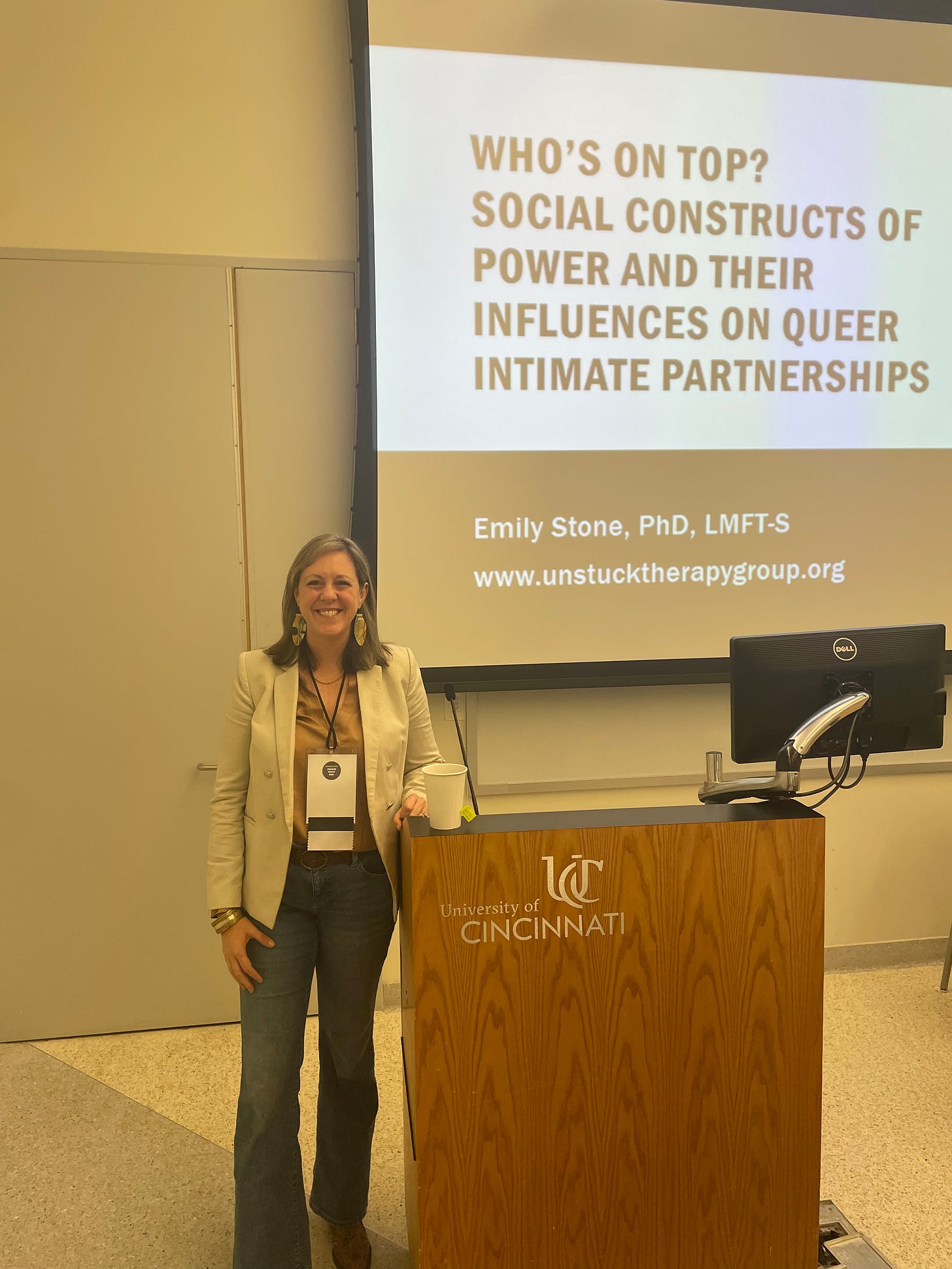This past weekend I attended and presented at the Contemporary Relationship Conference at the University of Cincinnati. My presentation was on constructs of power and how power affects intimate relationships.
As a therapist, power is a fascinating thing for me to observe in relationships. I work with individuals and couples every week and every week I see how issues of power play into conflict and the inability to feel secure and connected in partnerships.
My presentation used the ideas of Dr. Carmen Knudsen-Martin’s work, which provides guidance for how to be aware of power issues in couple dynamics in order to facilitate more satisfying and successful relationships.
How does power work into successful…and unsuccessful…relationships? And, what does successful mean anyways? Let’s start there. First, I look to couples to help me define what success looks like for them. Every couple has a slightly different idea of how success in their relationship is defined. For many couples, they have not considered what having a healthy or successful relationship means or how they define it until they come to couples therapy.
In general, what it typically means for most couples is that both partners feel safe and secure in the relationship in a way that makes room for genuine connection with one another and genuine connection with themselves as individuals. Successful relationships allow for growth and movement. They are flexible while also having healthy boundaries (which develop and change over the course of time).
Again, how does power play into that definition of health or success? I’m so glad you asked! Let’s get into it.
Power can be experienced in a way that is positive and negative for well-being. There are many ways to define power.
Power is the ability of one person to exert control or influence within a relationship or group.
The person with power in a group or relationship is usually the one with the ability to set the agenda for discussion and negotiation.
Power is the ability to get other people to act in the service of your goals.
In other words, the person with the power is who calls the shots, whether that is directly or indirectly, obviously or subtly.
Power can also be understood as EM-powerment. Power makes people more comfortable to take action towards their goals. Power can be used by a person to protect against threat or to overcome challenges. A personal sense of power increases an individual’s confidence and self-worth. Personal empowerment is associated with autonomy and agency or being in control of one’s own life and decisions. Having a personal sense of power, or being empowered, is having a say in one’s own life.
And, a sense of autonomy and agency are important for mental wellness. When a person does NOT feel like they have a say in their own life that person is more likely to experience mental illness like depression and anxiety.
The goal is not to diminish power in relationships, but to acknowledge where power imbalances creep up, which they do in all relationships, and then to work to bring balance of power back to the relationship.
Before we go any further, what in the world does this look like in the everyday life of a couple?
Well, let’s say that a couple is going along and the way that they have divvied up household and family roles feels just fine. Then, they have a baby. All of a sudden, a host of cultural narratives and messaging weighs in on decisions they make in regards to caregiving. Maybe this couple has always been intentional about their desires to have a sense of fairness in their roles and responsibilities, but now small decisions made even before the baby is born leaves the mom as the default parent on most daily, tedious parenting chores. These chores include things like meal planning, cleaning, picking out clothes, bathing, etc.
And, let’s say mom decides to stay home with the baby, a perfectly fine choice. Dad goes to work and is making the money that supports the family and so he is, maybe without thinking, also the one making all of the decisions on what to do with that money. Mom has to ask about bills and finances and what they can afford because she is so busy folding laundry and making dinners that she has not been kept in the financial loop for their relationship.
You might say well she has the power in the home and he has the power in making money so it is pretty equal.
Well, there is a big difference between responsibility and power.
Let me say that again. There is a big difference between responsibility and power.
Mom has all of the responsibility of the home without as much of the power.
When a person has all of the responsibility with none of the power, that is a recipe for depression, anxiety, anger, and burnout. That is true in a relationship, a family, a company, or any other organization. If a person, or group of persons, has all of the responsibility but none of the power (on making decisions, influencing direction, etc., etc.), watch out. It may not be tomorrow. It may not be next week. It may not even be next year, but at some point things are going to break down.
It may come as no surprise that as a relationship therapist I often see couples when things have broken down. Someone gets fed up. Someone is DONE walking through life feeling as though they do not have a sense of power in what happens in their life, when it happens, and who is happens with. That person becomes angry, depressed, shuts down.
Drs. John and Julie Gottman are well known for their research on couples. One finding from observing thousands of couples is that in successful relationships, partners feel like they are able to have influence on their mate. In other words, if I express a need or want, it matters to you and you are going to try to help me think through getting that need or want met. If I have an opinion, you take my opinion into account. If I make a suggestion, you listen to it, and even follow it.
The Gottman’s found that in straight couples it is incredibly important for the wife to see that she has influence on her husband. Men who accept influence from their female partners tend to have happier and more satisfying relationships.
Influence is power. Lack of influence is lack of power.
Power imbalances and lack of influence show up in all of the places you would expect: finances, sexual intimacy, decision making, household responsibilities, parenting, and much more.
And, watch out for sneaky ways gender narratives affect power imbalances.
Ever heard this comment? “She takes care of the inside of the house and I take care of the outside of the house.” Well, let’s think about that for a minute. The jobs on the inside of the house are usually daily grind tasks without many accolades. The jobs on the outside of the house are usually once a week or once a season events that get more praise. I bet you have heard “The yard looks fantastic!” in your neighborhood, but not “this toilet bowl is sparkling!”
And, what about this one? “She’s just better at making food than me” or “I do it because getting him to do it the way I want him to is just too much extra work.” We collude with gender narratives ALL of the time in ways that contribute to power imbalances. Of course, she is better at making food than you! She practices every day.
Some signs that power might be out of balance in a relationship.
1. One partner’s voice in discussions adopts more of a childlike or permission-asking tone while the other partner’s voice is more authoritative and parent-like.
2. One partner tends to accommodate to the other partner’s needs (emotional, physical, mental, etc.) more than the other. The attention to needs is one directional. For example, only one partner is asking about how the other is feeling, what they are thinking, what they need, etc.
3. One partner holds higher “status” in certain areas and it is frequently noted or used to control. One partner might have all of the power in child rearing decisions and another partner might have all of the power in financial decisions.
4. One partner is completely responsible for invisible labor such as maintaining the family calendar, adjusting schedules based on the other partner’s needs and wishes, keeping up with childcare details, etc.
5. One partner just has to ask more. One partner has to ask for help, for support, for dates, for money, for information, for alone time. The partner always asking typically has less power and influence in the relationship.
Dr. Carmen Knudsen-Martin named four aspects of relationship power. Here they are with some follow-up questions to ask about your own relationship.
1. Both partners hold equal status.
Whose interests shape what happens in your family? To what extent do you and your partner feel equally entitled to express and attain personal goals, needs and wishes? How are low status tasks like housework handled?
2. Accommodation to the relationship is mutual.
Are you or your partner more likely to organize his or her daily activities around the other? Does accommodation often occur automatically without anything being said, almost like accommodation is expected? Do you or your partner attempt to justify accommodations you make as being “natural” or the result of personality differences?
3. Attention to the other is mutual.
To what extent to you and your partner notice and attend to the each other’s needs and emotions? Does attention go back and forth between you and your partner? Does each give and receive? When attention is imbalanced do both of you express awareness of this and the need to rebalance?
4. There is a mutual sense of well-being of both partners.
Do you and your partner seem to be better off psychologically, emotionally, or physically than the other? Does one person’s sense of competence, optimism, or well-being seem to come at the expense of the other’s physical or emotional health? Does the relationship support the economic viability of you both?
One thing that can get really tricky for a relationship therapist is that when a couple comes in and is experiencing stress and conflict, a lot of times the partner without the power in the relationship has hit a wall and is DONE, sometimes resulting in that partner being more outspoken and upset. The other partner might present as calm, reasonable, and “level-headed”.
Reasonability is a power position. There is privilege in reasonability.
Being upset, the one “losing it”, the one thought of as the “crazy one” is a position with less power.
The therapist might naturally be more comfortable talking to the partner who is “level-headed” and reasonable. Partners who are upset are sometimes intimidating and difficult to sit with.
But make no mistake. The “crazy” one most likely has a lot to be “crazy” about. Losing it is their “hail Mary”. Going along and not having a voice isn’t working anymore. They are definitely using their voice now and it may be uncomfortable for everyone around them, including themselves.
Have you ever “lost it” in a relationship or work environment because the lack of power, the loss of your voice…having all of the responsibility but none of the power…just got to be too much?
It truly is a crazy making experience.
Of course, these ideas can be applied to issues way beyond intimate partnerships. There are all kinds of ways power imbalances occur in our society and ways in which cultural narratives continue to support the power imbalances.
Maybe we all should be asking the questions above for way more than just intimate partner relationships. Maybe if we start thinking in terms of power imbalances throughout society, the “crazy” in the world would start making a lot more sense.
That’s what I have to say today. I am guessing you have something to say, too. Happy to hear it.
If you enjoyed listening today, please consider subscribing to my Substack and sharing it with someone you think might enjoy it, too. The subscription is free and it would mean so much to me. Thank you!
Related Reads:















Share this post